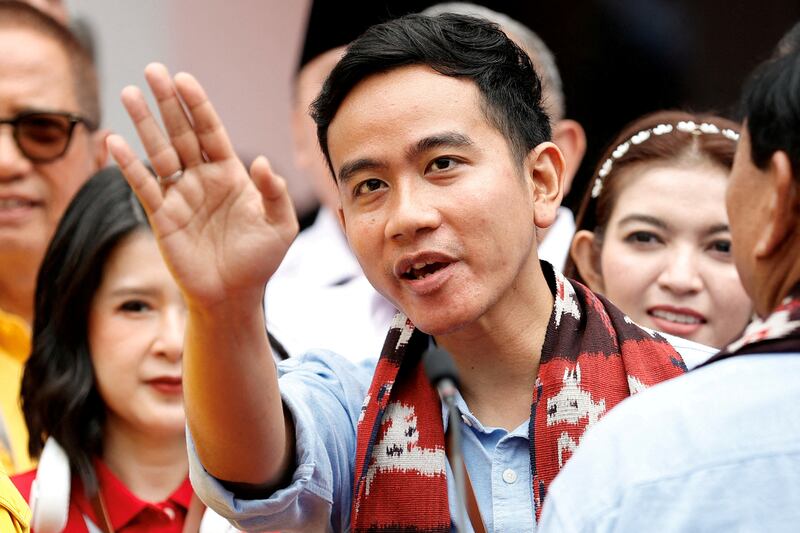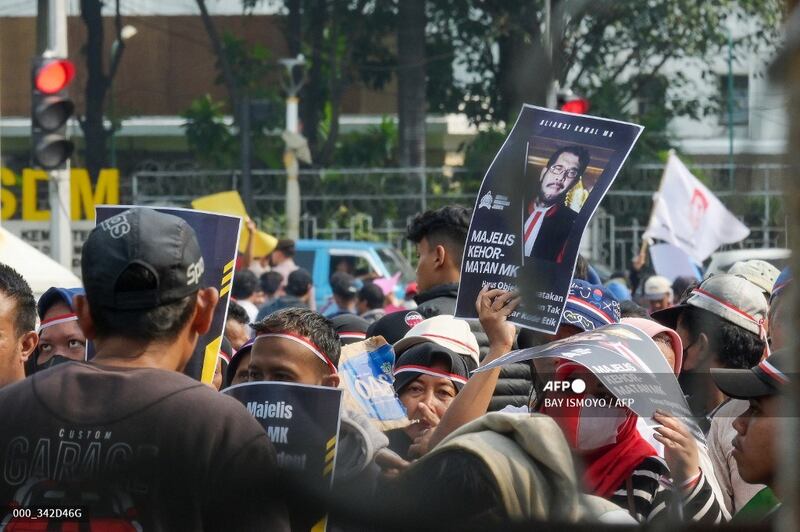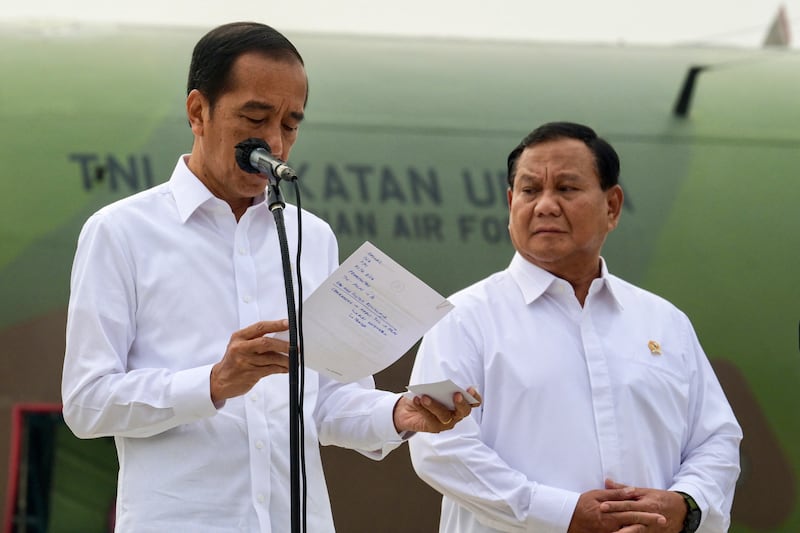An Indonesian judicial ethics body dismissed the Constitutional Court chief justice from his post on Tuesday after finding him guilty of ethical violations in a ruling that allowed President Joko “Jokowi” Widodo’s eldest son to run for the vice presidency.
The ethics council said Anwar Usman, a brother in-law of Jokowi, would remain on the court as a judge, but barred him from participating in cases related to disputes over the results of the February 2024 general election.
“The defendant has been proven to have committed serious violations of the code of ethics and conduct of constitutional judges,” said Jimly Asshiddiqie, the head of the ethics council.
Anwar was guilty of violating the principles of impartiality, integrity and independence, Jimly said, reading the decision
While Anwar has been dismissed, his ruling that led to the ethics investigation is binding. That means Jokowi’s son will be able to run for office in the upcoming election.
Anwar’s Oct. 16 ruling resulted from a petition challenging an age requirement of 40 for presidential and vice-presidential candidates.
The court upheld the requirement, but made an exception for candidates who had previously held or been elected regional leaders, such as governors or mayors.
Six days later, Jokowi's eldest son, Gibran Rakabuming Raka, 36, the mayor of Solo, was picked by presidential candidate and Defense Minister Prabowo Subianto to be his running mate.

The court was criticized because it was seen as favoring Gibran. It set up the ethics panel after lawyers and good governance groups accused Anwar, who is married to Jokowi’s sister, of having a conflict of interest.
Anwar defended the ruling saying it was legally sound and based on constitutional principles, but agreed to having the three-member ethics panel review the allegations.
Meanwhile, a group of plaintiffs have challenged the Oct. 16 ruling, asking that only governors – not mayors or regents – be eligible to run for president or vice president if they are younger than 40. The court will hear the new challenge on Wednesday.
Jimly, the head of the ethics panel, told reporters on Tuesday that any court ruling on this latest challenge would not affect Gibran’s candidacy and would “apply from the next election in 2029.”
‘People are fed up’
Anwar should have been stripped of his position as a constitutional judge, not just as the chief justice, said Jerry Sumampouw, coordinator of a civil society group called the Indonesian Voters Committee.
“The Constitutional Court’s regulations do not recognize dismissal from the chief justice position as punishment for constitutional judges,” he said, referring to provisions that only mention dismissal from the position of judge and not chief justice.
“He should have been dismissed if it was a serious violation,” Jerry said.
On social media platform X, some Indonesians said Tuesday’s ethics council decision would make it clear to the electorate how Gibran was able to run for office.
“At least the people know that Gibran’s path to becoming a vice presidential candidate resulted from serious ethical violations committed by his uncle Anwar Usman,” wrote @Mdy_Asmara1701.
Some said that Jokowi’s extremely high popularity rating, which The Jakarta Post said was between 70% and 80%, meant that the ruling wouldn’t dent the Prabowo-Gibran ticket.
But @chicohakim wrote that it would make a difference.
“Jokowi’s approval rating will not always be directly proportional to Gibran’s electability, especially since the majority of people are fed up with the vulgar way his uncle changed the rules at the Constitutional Court for the sake of candidacy,” @chicohakim wrote.
Indonesia, Southeast Asia’s most populous democracy, is notorious for corruption and nepotism at all levels of government.
The court itself has been hit by scandals involving corruption and ethics violations by its judges.
In 2014, the former chief justice, Akil Mochtar, was sentenced to life in prison for accepting bribes to influence the outcomes of regional election disputes. In 2017, another judge, Patrialis Akbar, was sentenced to eight years for receiving bribes from a meat importer who challenged a 2014 animal health law.

Questions have also trailed Jokowi in recent months about whether he is building a political dynasty by promoting his family members and loyalists to government.
Jokowi's other son, Kaesang Pangarep, was recently appointed chairman of the youth-oriented Indonesian Solidarity Party days after joining the organization.
The president has downplayed such suggestions. On Monday, he likened the brouhaha leading up to the elections to Korean soap operas that are known to be melodramatic.
“I see lately that there’s too much drama. Too much Korean drama. Too much soap opera,” he told politicians at an event celebrating the 59th anniversary of the Golkar party, a leading member of the coalition that backs Prabowo.
“It should be a battle of ideas, a battle of thoughts. Not a battle of feelings,” Jokowi said.

But the unlikely alliance between Prabowo and Jokowi’s son, Gibran, has stunned many Indonesians and raised questions about the outgoing president’s motives.
Constitutionally barred from seeking a third term, Jokowi has not openly stated that he supports Prabowo’s candidacy, but with his son on the ticket it appears obvious whom the president is backing.
Prabowo, a former special forces commander, lost presidential elections to Jokowi in 2014 and 2019, before being named defense minister. He has been the frontrunner for much of the campaign, although the latest opinion poll gives one of his two rivals, Ganjar Pranowo, a slight edge.
Ganjar, a former Central Java governor, is the candidate from Jokowi’s estranged party, the Indonesian Democratic Party of Struggle (PDI-P). The third presidential candidate is former Jakarta Gov. Anies Baswedan.
Jokowi, a former furniture businessman who rose to power as an outsider, has presided over a transformation of Indonesia’s infrastructure during his nine years leading the governor.
But as he prepares to leave office in 2024, he has faced mounting criticism for his authoritarian tendencies and his erosion of anti-corruption measures.
